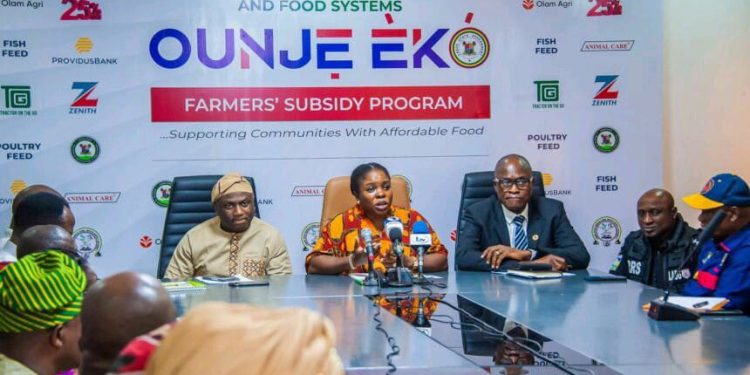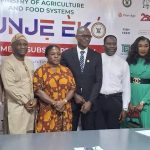In a decisive effort to strengthen local food production and curb rising inflation, the Lagos State Government has launched the Ounje Eko Farmers’ Subsidy Programme, a N500 million initiative aimed at supporting farmers and stabilizing food prices. The program, which provides a 25% subsidy on poultry and fish feed, is expected to ease production costs, enhance food supply, and make essential food items more affordable for Lagos residents.
Speaking at a press briefing on Wednesday, Abisola Olusanya, Commissioner for Agriculture and Food Systems, emphasized that the initiative is part of the government’s broader commitment to food security and agricultural development. She acknowledged the critical role farmers play in ensuring a stable food supply and noted that rising production costs have been a major concern.
“This initiative reaffirms our dedication to food security and strengthening the agricultural sector,” Olusanya said. “By easing the burden on our farmers, we are not just supporting the agricultural industry but also ensuring Lagosians have access to affordable food.”
The pilot phase of the subsidy program is set to begin on February 5 and will run for one month, with subsidies disbursed weekly. This phased rollout will enable the government to assess the program’s effectiveness and make necessary adjustments to optimize its impact.
The initiative comes at a crucial time when food prices have soared due to high input costs, supply chain disruptions, and inflationary pressures. Farmers, particularly those in poultry and aquaculture, have struggled with escalating feed prices, making it difficult to maintain production levels. With feed accounting for a significant portion of their operating costs, the subsidy is expected to provide much-needed relief, enabling farmers to scale up production and improve overall supply.
Lagos’ direct-feed subsidy model could serve as a blueprint for other states looking to address food security challenges. With food inflation affecting consumers nationwide, similar initiatives could help bolster local production and reduce reliance on expensive imports. If successful, the Ounje Eko program could inspire a nationwide shift toward targeted agricultural interventions, fostering a more sustainable and resilient food system.
By investing in its farmers, Lagos is taking a proactive step toward achieving long-term food security and economic stability. As the program unfolds, its effectiveness will be closely watched, not just within the state but across Nigeria, where food production challenges remain a pressing issue. If well-executed, the initiative could mark a significant milestone in the state’s journey toward self-sufficiency and a more robust agricultural sector.










